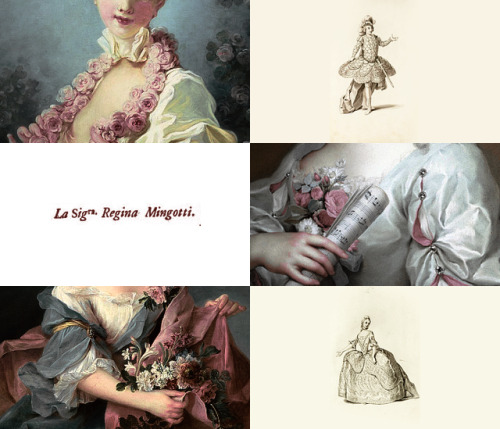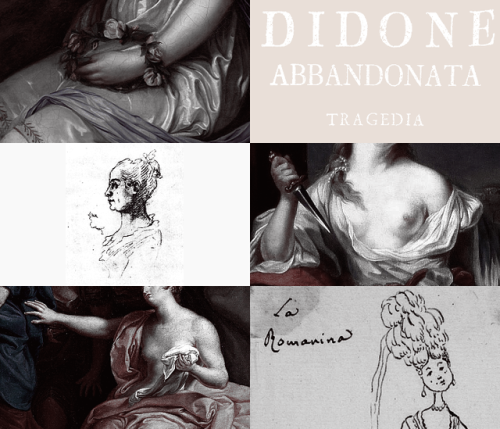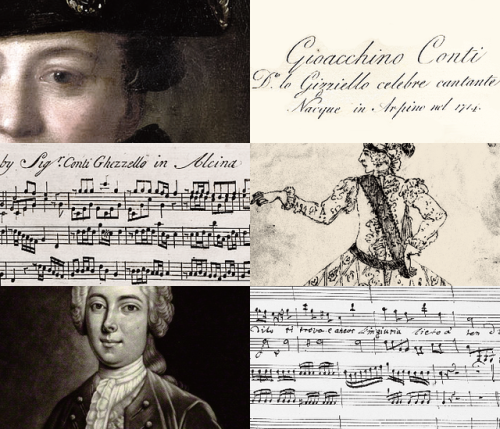#rivals meme
Co-stars & Rivals: CATERINA REGINA MINGOTTI
- Born: Naples, 16 Feb 1722
- Died: Neuburg an der Donau, 1 Oct 1808
- Voice:soprano
- Personality: Regina Mingotti was an Italo-German singer. Her early life is known almost wholly from her account to Burney in 1772, which is inaccurate in at least one important respect. According to this, she was the daughter of a German officer in the Austrian service at Naples and was educated in a convent at Grätz in Silesia. She attributed her firm intonation to the abbess, who made her practise scales without keyboard accompaniment. According to Prota-Giurleo she was the sister of the composer Michelangelo Valentini, hence presumably Italian, and may have had an early, undocumented Italian career. Her first recorded appearances were in Hamburg from 1743 to 1747, as a leading member of a notable company run by the impresario Pietro Mingotti, whom she married but soon parted from. She scored an immediate success in Dresden (1747), where she was kept on by the Saxon court and studied with Porpora. She sang in Naples, Prague, Madrid, Paris and London, where she took over the management of the Kings Theatre together with the leader of the orchestra, Felice Giardini, and incurred much obloquy. Her retirement was spent at Dresden, then Munich, and finally Neuburg, where her son Samuel von Buckingham was inspector of forests; he was apparently born (in London) of a liaison with a Piedmontese nobleman. Burney called her perfect mistress of her art, always grand in her style though lacking in grace and softness; her practical musical intelligence, he wrote, was equal to that of any composer he had known. She was admired as an actress, particularly in the breeches roles she often sang.Her portrait in crayons, by Mengs, is in the Dresden Gallery. It represents her, when young, with a piece of music in her hand; and, if faithful, it makes her more nearly beautiful than it was easy for those who knew her later in life to believe her ever to have been. ‘She is painted in youth, plumpness, and with a very expressive countenance.’
- One fact: In 1751 Mingotti went to Spain, where she sang with Gizziello in the operas directed by Farinelli, who was so strict a disciplinarian that he would not allow her to sing anywhere but at the Opera, nor even to practise in a room that looked on the street.
- One quote: ‘She spoke three languages, German, French, and Italian, so well that it was difficult to say which of them was her own. English she likewise spoke, and Spanish, well enough to converse in them, and understood Latin; but, in the three languages first mentioned, she was truly eloquent.’ Charles Burney
- One hit:Ah, se provar mi vuoi (Attilio Regolo)
Post link
Co-stars & Rivals: ANTONIO MARIA BERNACCHI
- Born: 23 June 1685
- Died: 1 March 1756
- Voice:alto
- Personality: Antonio Maria Bernacchi was an Italian castrato, composer, and teacher of singing. He studied with Francesco Antonio Pistocchi. His pupils included Farinelli, for a brief period during 1727, and the tenor Anton Raaff. Nowadays Bernacchi is best remembered for his association with the composer George Frideric Handel, in six of whose operas he sang. Bernacchi began his operatic career in Genoa in 1703. His appointment in 1714 as virtuoso to Prince Antonio Farnese led to widespread recognition throughout Europe, and he performed in operas by various famous composers of the day, including Hasse, Vinci, and Scarlatti. He was an especially frequent visitor to the theatres of Venice, appearing in more than twenty operas in that city between 1712 and 1724. In 1729 Handel took Bernacchi as his primo uomo for the second Royal Academy, in place of the departed Senesino. For Handel, Bernacchi created roles in Lotario (1729) and Partenope (1730). Despite his fine European reputation, Bernacchi’s success in England was mixed: though Charles Burney praised his intelligence as a singer, English audiences preferred Senesino. Though his natural musical gifts were not exceptional, he was renowned for technical virtuosity, especially in ornaments and cadenzas. He was accused of sacrificing expression to execution and adopting an instrumental style; his old master Pistocchi is said to have exclaimed: “I taught you to sing, and you want to play”. Bernacchi retired from the stage in 1738 and founded a famous singing school at Bologna. He died in 1756 in the city of his birth.
- One fact: In 1727 at Bologna Bernacchi had a contest with the famous Farinelli in a performance of La Fedelta (the later title of Orlandini’sAntigona). Though the younger Farinelli dazzled the audience with an elaborate cadenza, Bernacchi sang an even more higly embellished and polished aria that carried the day. The two castrati were rivals, yet thet become good friends and sang together frequently. Bernacchi taught some of his secrets to Farinelli, and the latter arranged a fine memorial service for his colleague after his death.
- One quote: Bernacchi has a vast compass, his voice mellow and clear, but not so sweet as Senesino, his manner better; his person not so good, for he is as big as a Spanish friar. (Mary Granvile)
- One hit: Dal mio ben che tanto amai (Demetrio)
Post link
Co-stars & Rivals: M A R I A N N A B U L G A R E L L I
- Stage name: La Romanina
- Born:1684
- Died: 26 February 1734
- Voice:soprano
- Personality: Marianna Bulgarelli, also known as Maria Anna Benti, was an Italian soprano of the 18th century. Bulgarelli was born and died in Rome; hence her nickname, “La Romanina.” She was a popular and successful singer of opera seria, renowned for her acting ability in particular. The singer is best remembered as a patron of the youthful Metastasio, whose work she encouraged and helped to develop. At her request Metastasio gave up the law and composed his first melodramma, a lyric tragedy in three acts on the conflict of love and duty, called Didone abbandonata (1723, first performance 1724). In Bulgarelli’s salon Metastasio formed his lifelong friendship with the castrato male soprano Farinelli and came to know such composers as Nicola Porpora (from whom he took music lessons), Domenico Sarro, and Leonardo Vinci, who were later to set his works to music. Meanwhile La Romanina was growing older; she had ceased to sing in public; and the poet felt himself more and more dependent in an irksome sense upon her kindness. In September 1729 he received the offer of the post of court poet to the theater at Vienna. La Romanina unselfishly sped him on his way to glory. She took the charge of his family in Rome; and he set off for Austria. Bulgarelli probably died suddenly upon the road from Rome to Vienna in 1734, after reading Metastasio’s letter that dissuaded her from the projected visit in Austria. All we know is that she left him her fortune after her husband’s life interest in it had expired, and that Metastasio, overwhelmed with grief and remorse, immediately renounced the legacy. This disinterested act plunged the Bulgarelli-Metastasio household at Rome into confusion. La Romanina’s widower married again. Leopoldo Trapassi, and his father and sister, were thrown upon their own resources.
- One fact: In honour of the birthday of the Empress of Austria, Metastasio composed Gli orti esperidi (1721), but kept his authorship secret. Gli orti esperidi, which was set to music by Nicola Porpora, and sung by Porpora’s pupil, the castrato Farinelli, won the most enthusiastic applause. The Roman prima donna, Marianna Bulgarelli, who played Venus in this serenata, spared no pains until she had discovered its author. and soon became enamoured of the poet.
- One quote: La Romanina was a great actress, and Metastasio himself learned from her the most admirable theatrical situations, such as that of jealousy in scenes XIV and XV of the second act of Didone, which weer entirely the invention of the singer (Saverio Mattei)
- One hit: Son fra l'onde in mezzo al mare (Gli orti esperidi)
Post link
Co-stars & Rivals: G I Z Z I E L L O
- Real name: Gioacchino Conti
- Born:Arpino, 28 Feb 1714
- Died:Rome, 25 Oct 1761
- Voice:soprano
- Personality:Conti was one of the greatest of 18th-century singers. He was an exceptionally high soprano with a compass of at least two octaves (c’ to c’“) and the only castrato for whom Handel wrote a top C.His nicknames derived from Domenico Gizzi, who taught him singing. Conti’s début at Rome in Vinci’s Artaserse (1730) was a spectacular success. His subsequent career led him throughout Italy, as well as abroad. In 1736–37 he was in London, where he had been engaged by George Frideric Handel, with whom he would build a profitable collaboration. The press reported that he met with an uncommon Reception; the poet Gray admired him ‘excessively’ in every respect except the shape of his mouth, which ‘when open, made an exact square’. Gizziello sang at many premieres for the best and most famous musicians of his time, including Niccolò Jommelli, Baldassare Galuppi and Johann Adolf Hasse. In 1749 he was invited by Farinelli to sing at Madrid with Mingotti; and stayed there three years. Conti always remained in good terms with Farinelli, who repeatedly invited him to Spain, terming him "Antiguo amigo” (longtime friend). From 1752 to 1755 he was employed by the Lisbon court theatre and sang in many operas, most of them by Perez; he is said to have narrowly escaped with his life from the Lisbon earthquake (1755), and was impressed with such a religious turn by the tremendous calamity, that he retreated to a monastery, where he ended his days (Burney), but not before he had imparted much sage and practical counsel to Guadagni. His retirement may, however, have been due to ill-health.
- One fact: In character Conti was the antithesis of Caffarelli, being as gentle as the latter was overbearing. However, a colourful anecdote relates how Caffarelli, rode post-haste to Rome from Naples just to attend incognito Conti’s debut; and full of enthusiasm eventually yelled at him: “Bravo, bravissimo Gizziello, it’s Caffariello who’s telling you!”
- One quote: Gizziello was ‘so modest and diffident, that when he first heard Farinelli, at a private rehearsal, he burst into tears, and fainted away with despondency’ (Burney)
- One hit:Non sono sempre vane larve (Arminio)
Post link
Co-stars & Rivals: A N N A G I R Ò
- Born:Mantua, c1710
- Died:after 1747
- Voice:contralto
- Personality: Anna Girò is known above all for her professional association with Antonio Vivaldi - a relationship suspected, at the time, of carrying over into their private lives, although modern research suggests the opposite. Anna’s father was a wig-maker of French extraction. The singer’s actual name was Teseire – Italianized to Tessieri – whereas Giro was a sobriquet her father had used. About 1722 she went to Venice to study singing, living with an elder half-sister, Paolina, who acted as her chaperone. She made her operatic début in Treviso in autumn 1723; her first appearance on the Venetian stage was in Albinoni’sLaodice (autumn 1724). Giro sang in over 50 operatic productions. She started, in her early teens, with minor travesty roles, then graduated to seconda donna and soon also to prima donna roles. Vivaldi, for whom she sang (nearly always as prima donna) in over 30 productions from 1726 to 1739, appears to have been her principal mentor. He once declared, with evident exaggeration, that he could not put on an opera without her, but she was well able to operate independently of him, as she proved during his transalpine tour of 1729 - 31 (when Giro was performing alongside Farinelli in Broschi’s Ezio and Porpora’s Poro) and again after his death in 1741. Her very successful career lasted until 1748, when, after singing in Piacenza at Carnival, she married a widowed count from that city, Antonio Maria Zanardi Landi, and retired honourably from the stage.
- One fact: The amendments to the libretto of Zeno’sGriselda that Vivaldi instructed Goldoni to make in 1735 were designed to hide her defects and promote her strengths.
- One quote: She was not pretty, but she had charms, a very slim waist, beautiful eyes, lovely hair, a charming mouth, and a small voice, but a great deal of acting ability. (Carlo Goldoni)
- One hit: Svena, uccidi, abbatti, atterra (Bajazet)
Post link





